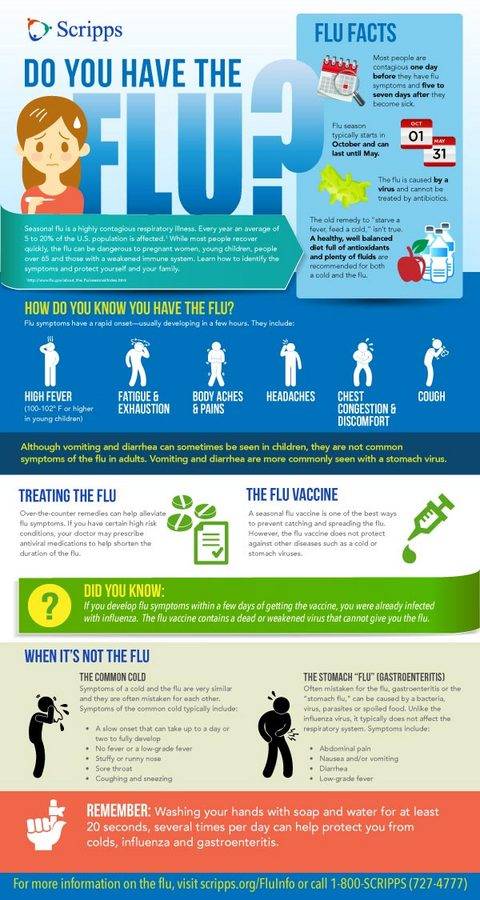Do You Have a Cold or the Flu?
Both have similar symptoms but flu is more severe

Both have similar symptoms but flu is more severe
Could that tickle in the back of your throat mean you’re coming down with the flu or is it just a common cold? It’s a common question that often comes up during the colder months of the year when respiratory viruses are busy circulating.
Both the common cold and the flu are caused by viruses. They have similar symptoms, which makes it hard to tell them apart at first.
Early signs of a cold or the flu include congestion, fatigue and cough. Flu symptoms are usually more severe. They often include fever and body aches, which are less common with a cold. Recognizing these differences can help you choose the right treatment and care.
“I’ve had people tell me that they’ve had the flu and it wasn’t that bad,” says Mark Shalauta, MD, a family medicine specialist at Scripps Clinic. “Those people probably didn’t have influenza. It feels like you’ve been hit by a bus and once you’ve had it, you know how different it is from a cold.”
Common cold symptoms
The common cold mainly affects the nose and throat. Symptoms include a runny nose, sneezing and stuffiness. You may also have a mild sore throat.
Unlike the flu, colds rarely cause fever or body aches. Symptoms usually last for about a week. Treatment aims to relieve discomfort with rest and plenty of fluids.
Flu symptoms and severity
Flu symptoms often appear suddenly. They include a high fever, body aches and fatigue. Coughing and a sore throat are also common. Muscle aches and chills may come with these symptoms.
In some cases, the flu can cause serious health issues. If symptoms last, seek medical attention.
Medication and home remedies
Finding the right treatment can help ease your symptoms. Both over-the-counter medications and home remedies can provide relief.
It’s important to choose what works best for you. Over-the-counter options can help manage your discomfort. You can also use home care strategies to improve your recovery.
Consider these remedies:
- Acetaminophen (Tylenol) for reducing flu fever and muscle aches
- Cough suppressants to ease persistent cough
- Decongestants to clear nasal congestion
- Humidifiers to reduce dryness and ease breathing
Always follow the dosing instructions carefully for medications. If you have questions, ask your doctor or a pharmacist.
Rest and hydration
Getting plenty of rest is very important when recovering from a respiratory illness. Your body needs time to fight the infection and rest helps. Stay away from intense activities and focus on sleep to support your recovery.
Staying hydrated is also very important. Drinking water, herbal teas and broth-based soups can help. These fluids keep mucus thin. This makes it easier to get rid of mucus and keeps your body well-hydrated.
Prevention: vaccines and healthy habits
Prevention is key when it comes to colds and flu.
Here are some easy steps you can take to stay healthy:
- Get the flu shot every year
- Eat a balanced diet and exercise often
- Wash your hands regularly
- Stay away from sick people
- Keep your surfaces clean
Getting the flu vaccine is one of the main ways to prevent the flu. It helps your immune system get ready before flu season starts.
“When my patients are skeptical about getting the vaccine, I remind them that it’s still the best protection we have,” notes Dr. Shalauta. “It takes about two weeks for the vaccination to build up enough antibodies for it to be effective.”
Flu shots are important for high-risk groups, such as the elderly and those with chronic conditions. They help lower the chance of getting the flu. If you do get the flu, the shots can make the symptoms less severe.
Doctors recommend everyone 6 months and older get the flu vaccine each year. It’s best to get it as soon as it is available, usually in the fall.
The flu vaccine is available as an injection or a nasal spray. Children under 9 years old who have never had the vaccine need two doses. These doses should be given one month apart.
When to see a doctor
Sometimes, a cold or flu can become more serious. It’s important to know when to seek medical help.
If you have trouble breathing or feel chest pain, see a doctor right away.
If other symptoms intensify, like a high fever lasting over three days, take note. Vomiting or dizziness should also be taken seriously. Young children and the elderly need care right away. Other warning signs are a persistent cough or a worsening sore throat.
Remember, early intervention can prevent further health problems and promote a quicker recovery.
Flu vaccines at Scripps
The flu vaccine is widely available across San Diego County, including at Scripps.
For Scripps patients, flu vaccine clinics are offered at most Scripps Clinic and Scripps Coastal primary care locations, or patients can receive flu vaccination during regularly scheduled primary care appointment.
Flu vaccines are also available on a walk-in basis at Scripps HealthExpress locations for everyone.
Scripps patients can use the MyScripps portal to schedule a visit with their primary care physician to receive vaccination for influenza, pneumonia and other illnesses, or they can call their primary care physician’s office directly. Those without a MyScripps account can call 858-533-8263 for flu vaccination information.

Download the flu infographic. (PDF, 1.7 MB)